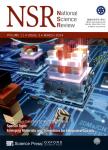Efficient network immunization under limited knowledge
Efficient network immunization under limited knowledge作者机构:Department of Systems ScienceNational University of Defense Technology Department of Physics Bar-Ilan University Faculty of ScienceJiangsu University Network Science InstituteNortheastern University Department of Physics Yeshiva University
出 版 物:《National Science Review》 (国家科学评论(英文版))
年 卷 期:2021年第8卷第1期
页 面:127-134页
核心收录:
学科分类:07[理学] 070104[理学-应用数学] 0701[理学-数学] 10[医学]
基 金:the National Natural Science Foundation of China(61973143, 71974080 and 71690242) the National Key R&D Program of China (2017YFC1200301) the Israel Science Foundation (189/19) the joint ChinaIsrael Science Foundation (3132/19) the NSF-BSF the BIU Center for Research in Applied Cryptography and Cyber Security DTRA (HDTRA-1-19-1-0016) for financial support
主 题:percolation complex networks network immunization critical phenomena
摘 要:Targeted immunization of centralized nodes in large-scale networks has attracted significant ***, in real-world scenarios, knowledge and observations of the network may be limited, thereby precluding a full assessment of the optimal nodes to immunize(or quarantine) in order to avoid epidemic spreading such as that of the current coronavirus disease(COVID-19) epidemic. Here, we study a novel immunization strategy where only n nodes are observed at a time and the most central among these n nodes is immunized. This process can globally immunize a network. We find that even for small n(≈10) there is significant improvement in the immunization(quarantine), which is very close to the levels of immunization with full knowledge. We develop an analytical framework for our method and determine the critical percolation threshold p;and the size of the giant component P∞ for networks with arbitrary degree distributions P(k). In the limit of n →∞ we recover prior work on targeted immunization, whereas for n = 1 we recover the known case of random immunization. Between these two extremes, we observe that, as n increases,p;increases quickly towards its optimal value under targeted immunization with complete information. In particular, we find a new general scaling relationship between |p;(∞)-p;(n)| and n as |p;(∞)-p;(n)| ~n;exp(-αn). For scale-free(SF) networks, where P(k) ~ k;, 2 γ 3, we find that p;has a transition from zero to nonzero when n increases from n = 1 to O(log N)(where N is the size of the network). Thus, for SF networks, having knowledge of ≈log N nodes and immunizing the most optimal among them can dramatically reduce epidemic spreading. We also demonstrate our limited knowledge immunization strategy on several real-world networks and confirm that in these real networks, p;increases significantly even for small n.



